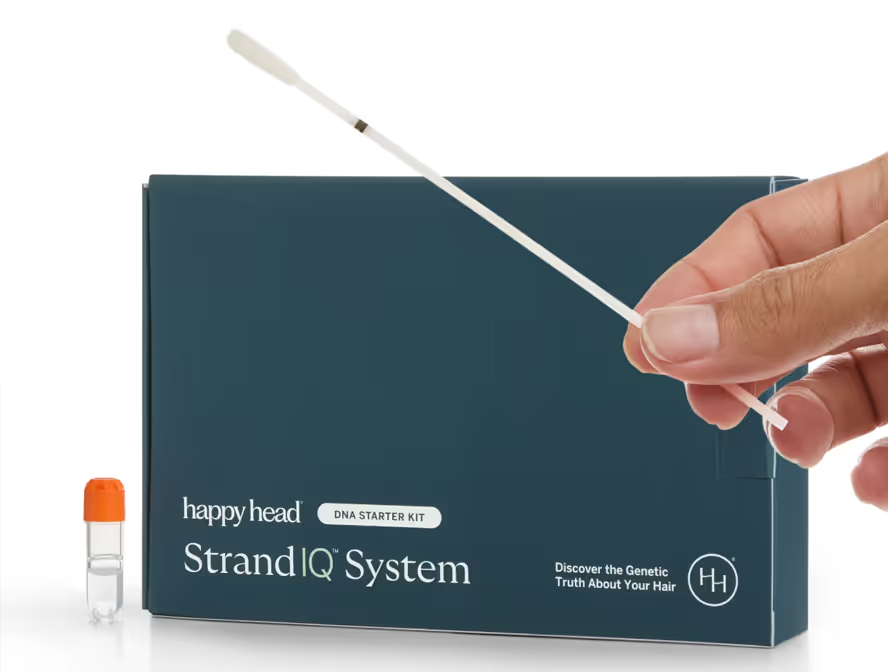Vitamin C is a powerful, water-soluble nutrient that plays several key roles in hair and scalp health. It supports collagen production, which helps maintain scalp structure and hair follicle anchoring. It also strengthens capillaries, improving nutrient and oxygen delivery to follicles.
Beyond structural support, vitamin C enhances iron absorption, which is vital for hair growth. It also acts as a potent antioxidant, helping to defend follicle cells against oxidative stress—a contributor to premature shedding and thinning.
If your genes reduce your body’s ability to retain or transport vitamin C efficiently, you may notice signs like slower scalp healing, breakage-prone hair, or reduced volume over time.
How Genetics Affect Vitamin C Processing
Some genetic variants can reduce vitamin C bioavailability or increase its excretion. In these cases, diet alone isn’t enough to stave off functional deficiencies, leading your scalp and hair to not receive enough of the nutrient to maintain peak health.
Signs of weak vitamin C processing may include:
- fragile or breakage-prone hair
- longer healing time for minor scalp irritations
- reduced hair volume or dull appearance
- more visible shedding under stress or illness
Fortunately, targeted nutrition and lifestyle adjustments can help maintain optimal levels.
Recommendations Based on Genetic Risk
The following suggestions are designed to support scalp and hair health by improving vitamin C intake and utilization based on your Happy Head StrandIQ-identified genetic risk level.
Low Risk: Maintain Consistent Intake
If your genetic profile shows low risk for weak vitamin C processing, maintaining adequate intake through a varied diet is usually sufficient for supporting scalp and follicle health.
- Eat vitamin C-rich foods daily
Prioritize eating a variety of vitamin c-rich foods each day. Good sources of vitamin C include oranges, kiwi, mango, pineapple, strawberries, and raspberries. - Add vegetable sources
In addition to fruits, vegetables such as broccoli, bell peppers, spinach, and Brussels sprouts all help to provide steady support for collagen and capillary health. - Avoid nutrient loss
Vitamin C is sensitive to heat, so steam vegetables lightly rather than boiling to preserve their nutrient content.
Medium Risk: Boost Intake and Protect Nutrient Quality
If your StrandIQ analysis has identified you as being at moderate genetic risk, your body may not retain or utilize vitamin C as efficiently. The following strategies aim to enhance dietary intake, improve nutrient preservation, and reduce factors that can accelerate depletion.
- Increase dietary variety
Rotate fruits like papaya, cantaloupe, blueberries, and watermelon to ensure broad-spectrum vitamin C intake. - Check your risk factors
Smokers, those under chronic stress, and individuals with inflammatory conditions may require more vitamin C to maintain scalp health. - Consider professional input
If your hair is brittle or your scalp heals slowly, talk to your Happy Head healthcare professional about dietary adjustments or supplementation.
High Risk: Prioritize Absorption and Professional Guidance
A high-risk profile suggests that vitamin C processing or retention may be significantly reduced, increasing vulnerability to scalp fragility and hair breakage. These recommendations emphasize bioavailability, protective measures, and professional oversight to safeguard hair and scalp integrity.
- Focus on consistent, high-quality intake
Combine citrus fruits, berries, leafy greens, and cruciferous vegetables to maintain stable vitamin C levels. - Evaluate lifestyle factors
Smoking, heavy alcohol use, or high oxidative stress may increase your needs beyond dietary intake. - Consult your provider about supplements
Your healthcare provider can help determine the right dose and form of vitamin C, especially if you have functional deficiencies or increased excretion risk.
Supporting Long-Term Hair and Scalp Health
Optimizing vitamin C is about more than preventing classic deficiency symptoms. It strengthens your scalp’s foundation, enhances follicle energy delivery, and protects against oxidative stress that contributes to shedding and breakage.
By tailoring your intake to your genetic profile and lifestyle, you can keep your scalp resilient and your hair looking fuller and healthier over time.
Resources
StrandIQ SNP Marker Count: 14
StrandIQ Genes for Trait:
BCAS3, FADS1, FADS2, GSTA1, GSTA11P, GSTA6P, LINC01229, MAFTRR, MZB1, RGS14, SIL1, SLC23A1, SLC23A2, TBX2-AS1
References:
Cahill, L.E., El-Sohemy, A. (2009). Vitamin C transporter gene polymorphisms, dietary vitamin C and serum ascorbic acid. Journal of Nutrigenetics and Nutrigenomics, 2(6), 292–301. PMID: 20588054.
Duell, E.J., et al. (2013). Vitamin C transporter gene (SLC23A1 and SLC23A2) polymorphisms, plasma vitamin C levels, and gastric cancer risk in the EPIC cohort. Genes & Nutrition, 8(6), 549–560. PMID: 23737080.
Horska, A., et al. (2011). Vitamin C levels in blood are influenced by polymorphisms in glutathione S-transferases. European Journal of Nutrition, 50(6), 437–446. PMID: 21152927.
Mattila, M., et al. (2020). Plasma ascorbic acid and the risk of islet autoimmunity and type 1 diabetes: the TEDDY study. Diabetologia, 63(2), 278–286. PMID: 31728565.
Ratajczak, A.E., et al. (2020). Vitamin C deficiency and the risk of osteoporosis in patients with an inflammatory bowel disease. Nutrients, 12(8), 2263. PMID: 32751086.
Ravindran, R.D., et al. (2019). Genetic variants in a sodium-dependent vitamin C transporter gene and age-related cataract. British Journal of Ophthalmology, 103(9), 1223–1227. PMID: 30442817.
Senthilkumari, S., et al. (2014). Polymorphisms in sodium-dependent vitamin C transporter genes and plasma, aqueous humor and lens nucleus ascorbate concentrations in an ascorbate depleted setting. Experimental Eye Research, 124, 24–30. PMID: 24815519.
Timpson, N.J., et al. (2010). Genetic variation at the SLC23A1 locus is associated with circulating concentrations of L-ascorbic acid (vitamin C): evidence from 5 independent studies with >15,000 participants. American Journal of Clinical Nutrition, 92(2), 375–382. PMID: 20519558.
Yu, Z., et al. (2022). Association between circulating antioxidants and longevity: insight from Mendelian randomization study. BioMed Research International, 2022, 4012603. PMID: 35132376.
Zheng, J.S., et al. (2021). Plasma vitamin C and type 2 diabetes: genome-wide association study and Mendelian randomization analysis in European populations. Diabetes Care, 44(1), 98–106. PMID: 33203707.
This content, including StrandIQ™ DNA analysis reports and any Happy Head products and/or services referenced therein, is for informational and cosmetic purposes only. It is not intended to diagnose, treat, cure, or prevent any disease. This content does not constitute medical advice and should not be used to make healthcare decisions. References to prescription treatments are educational in nature. Always consult a licensed healthcare professional for any medical concerns or treatment decisions.










.avif)

